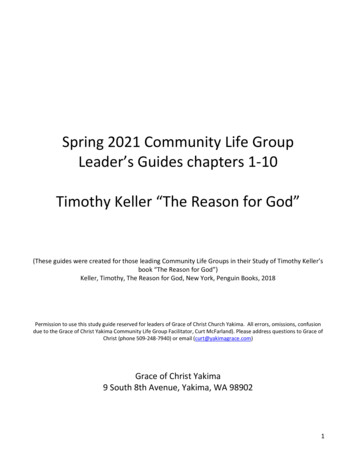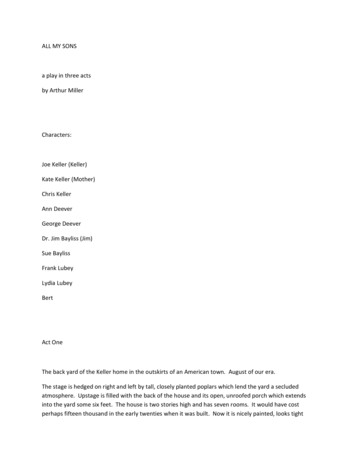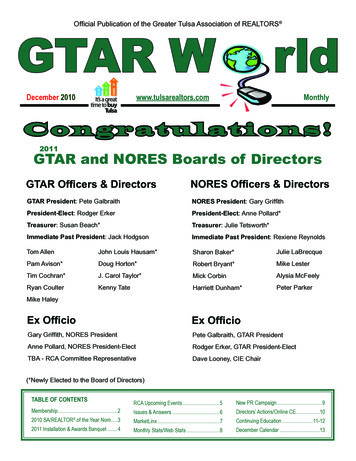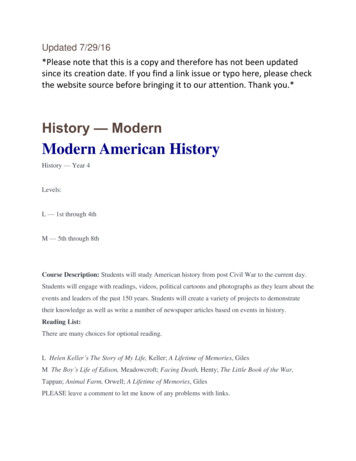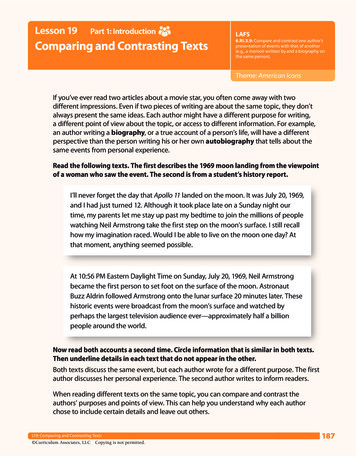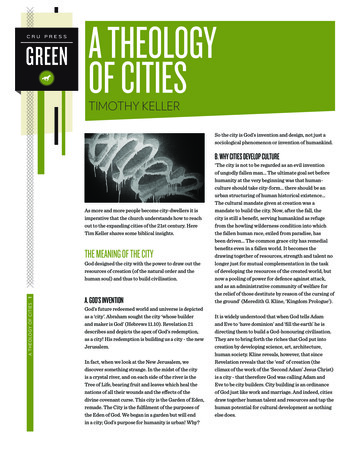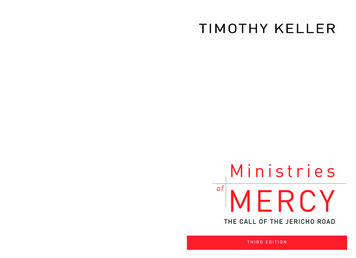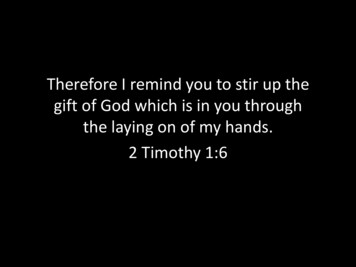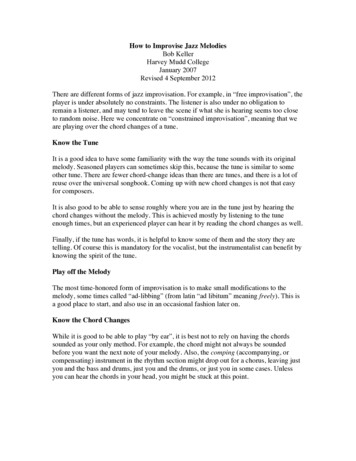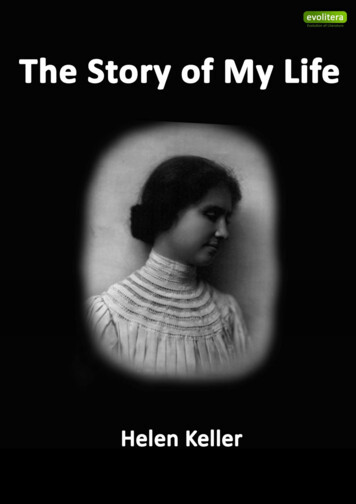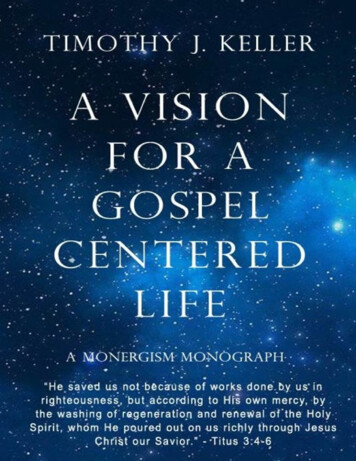
Transcription
A Vision for a Gospel-Centered LifeThe Gospel: Justified – Tested - Works
13 SermonsofDr. Timothy J. KellerRedeemer Presbyterian ChurchNew York City , New YorkandDr. David Martyn Lloyd-JonesWestminster ChapelLondon , England
Table of ContentsPreface: Standing on the Shoulder of GiantsIntroduction: RevelationChaper I: The Prodigal SonsChapter II: Christ, Our LifeChapter III: The GospelChapter IV: Where is Your Faith?Chapter V: The City of GodChapter VI: Living in CommunityChapter VII: WitnessChapter VIII: JusticeChapter IX: Cultural RenewalChapter X: The Gospel & Your WealthChapter XI: The Gospel & YourselfChapter XII: The Gospel, the Church, and the WorldJesus at His Friend's FeastEndnotes
PREFACE – STANDING ON THE SHOULDEROF GIANTSFaith comes from hearing, and hearing through the word ofChrist.Romans 10:17 (ESV)John Owen, the greatest Puritan theologian and contemporary of JohnBunyan, when asked by King Charles II why he, a great scholar, went tohear an uneducated tinker preach said, "I would willingly exchangemy learning for the tinker’s power of touching men’s hearts.[1]"Once or twice in a century God hauls off and creates a servant so mightyin gift that the only proper response is “Wow!” Charles HaddonSpurgeon was one of God’s special projects in the nineteenth century.Dr. Haddon Robinson, Introduction to Spurgeon’s Morning and Evening[2]Dr. David Martin Lloyd-Jones was “a thoroughly humble man. Hewas a man of prayer, a powerful evangelist, an expository preacherof rare quality, in the fullest sense a servant of the Word of God.” Dr.F.F. BruceIn 1959, Dr. Lloyd Jones did a series of lectures on revival. When Icame to New York City (in 1989), and was trying to figure how topreach, I listened to the Doctor’s evening sermons that all through the‘50s and into the ‘60s he would preach evening messages they wereexpository but they were evangelistic aimed at the person who didn’t
believe in London. I listened to scores of them maybe hundreds ofthem. [3]Tim Keller, Senior Pastor, RedeemerPresbyterian Church, NYCTim Keller is the most culturally relevant preacher in America today.Dr. Donald A. Carson, to afriend, September, 2007] ] ] ]These thirteen sermons – herein labeled “ Readings ” in manuscript form,were preached in London and New York City . The 4th sermon by Dr.Martyn Lloyd-Jones was preached on March 14, 1954 . The other 12sermons were preached by Dr. Timothy Keller in the fall of 2005 atRedeemer Presbyterian Church in New York City , a series entitled theVision of Redeemer.The first three sermons of Dr. Keller focus on the Gospel of Jesus Christ.The 4th sermon by Dr. Lloyd-Jones deals with the nature of faith, and thechallenges every Christian will face, if indeed they are Christian. The last9 sermons by Dr. Keller focus on the implications of really believing thegospel.Dr. David Martyn Lloyd-Jones ( 20 December 1899 – 1 March 1981 )was a Welsh Protestant minister, preacher and medical doctor who wasinfluential in the Reformed wing of the British evangelical movement inthe 20th century. For almost 30 years, he was the minister ofWestminster Chapel in London . Dr. Lloyd-Jones was expected to assumethe position of the Royal Family Physician following his mentor, but
shortly after graduation gave up his medical practice intentions to preachthe Gospel.Dr. Timothy J. Keller (born 1950) is an American Christian apologist,author, speaker, and the founding pastor of Redeemer PresbyterianChurch in New York City , New York . He is a graduate of GordonConwell Theological Seminary (M.Div., 1975) and WestminsterTheological Seminary, where he received his D.Min in 1981 He wasordained by the Presbyterian Church in America (PCA) and served as apastor in Virginia for nine years, while serving as director of churchplanting for the PCA.
INTRODUCTIONWhere there is no vision no redemptive revelation of God the peopleperish;Proverbs 29:18 -Amplified BibleA visionary light settled in her eyes. She saw the streak as a vast swinging bridgeextending upward from the earth through a field of living fire. Upon it a vasthorde of souls were rumbling toward heaven. There were whole companies ofwhite-trash, clean for the first time in their lives, and bands of black niggers inwhite robes, and battalions of freaks and lunatics shouting and clapping andleaping like frogs.And bringing up the end of the procession was a tribe of people whom sherecognized at once as those who, like herself and Claud, had always had a littleof everything and the God-given wit to use it right. She leaned forward toobserve them closer. They were marching behind the others with great dignity,accountable as they had always been for good order and common sense andrespectable behavior. They alone were on key. Yet she could see by their shockedand altered faces that even their virtues were being burned away. She loweredher hands and gripped the rail of the hog pen, her eyes small but fixedunblinkingly on what lay ahead.“Revelation [i]”Flannery O’ConnorThe first revelation, after the book hit Mrs. Turpin directly over herright eye, came as her head cleared, and she asked the book-throwing girl
what she had to say for herself. The girl said, “Go back to hell where youcame from, you old wart hog.” Metaphorically speaking, it was a“sledgehammer-to-the-heart-beginning” to a day which ended withMrs. Turpin gasping, unblinkingly, at a mind-blowing revelation abouther self-righteousness.Isaiah and Jeremiah major prophets of the Old Testament as wellas minor prophets, delivered similar blows to the ostensibly God-fearingpeople of their times. The same was true in Jesus’ day vis-à-vis Hisencounters with the legalistic and unloving “religious leaders” trackingand monitoring His every word and movement. Dr. Timothy J. Keller,Senior Pastor of Redeemer Presbyterian Church in New York City, andauthor of the New York Times bestseller, Reason for God: Belief inan Age of Skepticism [ii] – critiqued for his own people the ease bywhich people rest easily in their own presuppositions about life death and immortality in a 12-part sermon series in the Fall of 2005. It could beconsidered a review of the ultimate questions and answers to the “why ofour lives?” as well as a summary of 16 years of ministry in Manhattan tothat time, having begun in April, 1989. Each week Dr. Keller remindedhis listeners that the Vision of Redeemer was – “(we’re here) to build agreat city, for all people, through a movement of the Gospel, that bringsabout personal conversion, community formation, social justice andcultural renewal in New York City, and through New York the world.You may come to this work as a skeptic, a seeker, or one convincedthat Jesus remains a fascinating historical figure but His followers willalways be religious hypocrites (like Mrs. Turpin) – part of the reason wehave so many problems in the world today, You may well be surprisedby the insightful words of Dr. Keller. Or, you may come as a person offaith – one believing that Jesus is who He said He was and perhaps
discomforted by Mrs. Turpin’s new self-knowledge. You too will findthis work challenging to your own presuppositions.The need for a sustaining vision that we can look to repeatedly wassuccinctly summarized by Eugene Peterson in his book Run with theHorses: The Quest for Life at Its Best. [iii]There is no living the life of faith, whether by prophet or person, withoutsome kind of sustaining vision. At some deep level we need to beconvinced, and in some way or other we need periodic reminders, thatno words are mere words. In particular, God's words are not merewords. They are promises that lead to fulfillments. God performs whatHe announces. God does what He says.A sustaining vision is imperative to mitigate the 1000s of messagesthat pass our eyes every day – messages without encouragement, again,as Peterson put it:If we forget that the newspapers are footnotes to Scripture, and not theother way around, we will finally be afraid to get out of bed in themorning. Too many of us spend far too much time with the editorialpage and not nearly enough with the prophetic vision. We get ourinterpretation of politics and economics and morals from journalistswhen we should be getting only information; the meaning of the worldis most accurately given to us by God's Word. [iv]These twelve sermons of Dr. Keller, along with Dr. Lloyd-Jones onesermon, can easily serve as a comprehensive “sustaining vision,” orScriptural worldview of our life of faith, in which every area of ourlives as believers, and as a community of believers, is addressed. Thisconcept of “worldview” comes from the German word Weltanschauung
meaning, the fundamental cognitive orientation of an individual orsociety encompassing the entirety of the individual or society's knowledgeand point-of-view. These sermons now in print form, for visuallearners, and supplemental to the audio, can serve as a valuable resourcefor anyone desiring to live out the call of Jesus Christ from a Scripturalworldview in the context of the vagaries of the Christian’s journey in anyplace in this world.In his biography of John Calvin [v], John Piper noted that thefundamental issue for Calvin, and about which he wrote was “from thebeginning to the end of his life the issue of the centrality andsupremacy and majesty of the glory of God” to which Martin Lutherresponded, “Here is a writing which has hands and feet. I rejoice thatGod raises up such men. [vi]” God does raise up such men,throughout history, and we believe He has done so in Tim Keller, tobecome “the most culturally relevant preacher in America today. [vii]”These 13 sermons provide a worldview unique to the Gospel, to thepreaching of Drs. Lloyd-Jones and Keller, and unique to their respectivechurches. We sense that these sermons encapsulate the true nature of theGospel (in the first 3 sermons and first three Readings of this book) –particularly the core idea of Paul in all his letters dealing with ourstanding before God, and summarized succinctly in Titus 3:4-6 But whenthe goodness and loving kindness of God our Savior appeared, [5] Hesaved us, not because of works done by us in righteousness,but according to His own mercy, by the washing of regeneration andrenewal of the Holy Spirit, [6] whom He poured out on us richly throughJesus Christ our Savior. [viii]The 4th Reading (Where is Your Faith? – by Dr. Lloyd-Jones)should remove once for all any falsely held assumption that a life of faith
will be a one of great comfort and few, if any, trials.The last 9 Readings of this monograph, address the “commands” ofScripture – the call to a life of Biblical faith – “He leads me in paths ofrighteousness for His name’s sake” – Psalm 23:3b. Briefly, the terms"indicative" and "imperative" refer to two different Greek verb moodscommonly used by the New Testament authors in their teaching onjustification and sanctification. The indicative is the mood of certainty oractuality. The imperative is the mood of command. The New Testamentuses imperative statements when saying what we should do [ix]. The firstthree readings of this monograph dealing with the Gospel - tell us withcertainty how we come to be in right standing before God (justified). Thelatter nine Readings address the call to a life pleasing to God – a faithwhich works.Lloyd-Jones’ question was – where is your faith! How is your faithhelping you in trying times?In the final 9 Readings , Keller is surely suggesting (without doubt) in the21st Century the same issue raised by James in the 1st Century, do youreally have a faith that works, rather than an intellectual assent thatgives you an unreasonable security about your ultimate future?
READING 1 - The Prodigal SonsLuke 15: 1-2; 11-321Nowthe tax collectors and "sinners" were all gathering around to hearhim. 2But the Pharisees and the teachers of the law muttered, "This manwelcomes sinners and eats with them." 11Jesus continued: "There was aman who had two sons. 12The younger one said to his father, 'Father,give me my share of the estate.' So he divided his property betweenthem.13"Notlong after that, the younger son got together all he had, set off fora distant country and there squandered his wealth in wild living. 14Afterhe had spent everything, there was a severe famine in that wholecountry, and he began to be in need.15So he went and hired himself outto a citizen of that country, who sent him to his fields to feed pigs.16Helonged to fill his stomach with the pods that the pigs were eating, but noone gave him anything.17"Whenhe came to his senses, he said, 'How many of my father's hiredmen have food to spare, and here I am starving to death! 18I will set outand go back to my father and say to him: Father, I have sinned againstheaven and against you. 19I am no longer worthy to be called your son;make me like one of your hired men.' 20So he got up and went to hisfather. "But while he was still a long way off, his father saw him andwas filled with compassion for him; he ran to his son, threw his armsaround him and kissed him.21"Theson said to him, 'Father, I have sinned against heaven andagainst you. I am no longer worthy to be called your so 22"But the father
said to his servants, 'Quick! Bring the best robe and put it on him. Put aring on his finger and sandals on his feet. 23Bring the fattened calf andkill it. Let's have a feast and celebrate. 24For this son of mine was deadand is alive again; he was lost and is found.' So they began to celebrate.25"Meanwhile,the older son was in the field. When he came near thehouse, he heard music and dancing. 26So he called one of the servantsand asked him what was going on. 27'Your brother has come,' he replied,'and your father has killed the fattened calf because he has him back safeand sound.' 28"The older brother became angry and refused to go in. Sohis father went out and pleaded with him. 29But he answered his father,'Look! All these years I've been slaving for you and never disobeyedyour orders. Yet you never gave me even a young goat so I couldcelebrate with my friends. 30But when this son of yours who hassquandered your property with prostitutes comes home, you kill thefattened calf for him!'31"'My son,' the father said, 'you are always with me, and everything Ihave is yours. 32But we had to celebrate and be glad, because thisbrother of yours was dead and is alive again; he was lost and is found.' "A Story of Two SonsThis text has been crucial in both my life and in the life of our church.This parable is famous and for centuries has been called "The Parable ofthe Prodigal Son." The son. It’s a great mistake to think that this is astory about one son. It’s the story of two sons. It’s a story of a youngerand an older brother. You are meant to compare and contrast them. Andif you don't compare and contrast them the way Jesus wants you to,you’re going to miss the radical message of this parable, and it isradical. Jesus is saying here this: "Every thought the human race has
ever had about how to connect to God whether East or West, whether inthe ancient, modern, post-modern era, in every religion, in all secularthought, it's been wrong. Every human idea of how to connectwith God is wrong."Jesus is here to shatter all existing human categories. An historianonce said and it is hard to grasp this when Christianity first appearedin the world, nobody called it a religion. It wasn't seen as anotherreligion. It was called the "anti-religion." It was seen as anti-religion. TheRomans called the Christians for two hundred years "atheists." And thereason was that the Romans understood that what Christianity wassaying about God was so different than what any other religion said, thatis really shouldn't be given the same kind of name. It’s in a whole othercategory all together. And they were right. And this passage tells us whythey were right.First, let’s tell the story. Let’s make sure we understand the story.Then let's draw out the three things I think Jesus is trying to tell us in thisstory.a story in two acts.Act One: The Lost Younger BrotherAct One begins with a speech when the younger brother comes to thefather and says "Father, give me my share of the estate." Now theoriginal hearers when they heard this would have been absolutelyastounded. If you had two sons, then when you died the estate would bedivided two-thirds to the elder, one-third to the younger. The reason orrule of thumb was the oldest got a double portion of what all the otherchildren got. So, if there were only two, the oldest got two-thirds, theyoungest got one third. But that happened when the father died. Whenthe son came and asked the father for his share of the estate before the
father’s death, the original hearers would have been astounded. Onecommentator, Kenneth Bailey (a scholar who knows something about thehistory and culture of the time) put it like this: "To ask for the inheritancewhile the father is still alive is to wish him dead. [x]" What the youngerson is saying is: "I want your stuff, but I don't want you. I want thefather's things, but I don't want the father. My relationship with you hasjust been a means to an end. And I am tired of it. I want my stuff now."Unheard of!But even more unheard of is the second half of verse 12 because if theoriginal hearers were amazed at the speech in verse 12a, they wereabsolutely astonished by what the father did in verse 12b. Bailey goes onto say: "A traditional middle-eastern father could only respond in oneway. He would have been expected to drive the boy out of the house withverbal if not physical and violent blows [xi].” But this father doesn't dothat. What does it say? “So he divided his property between them.” Thetranslation uses the word property here, but the Greek word used isbios, from which we get our word biology. What it’s really saying is - thefather divided his life between them. Why would he say that? Wedo not understand the relationship that people in the past had to theirland to their land. This father's estate was his land his wealth was hisland. He would have had to sell off a third of his land to give his son thatpart of the estate. Now if you really want to understand this you couldalways read a lot of books, like those of Wendell Berry.But, if you would like a little bit briefer glimpse you can always look atthe musical Oklahoma of Rogers and Hammerstein. [xii] One of thelines in the theme song goes like this: “Oh we know we belong to theland. And the land we belong to is grand.” Do you notice what it says?The land we belong to. It doesn’t say the land belongs to us. We belong
to it. We don’t understand that. But ancient, Middle Eastern familiesidentified with their land. Their very identity was bound up with the land.To lose your land was to lose yourself and to lose part of your land wasto lose your standing in the community and that standing was tied tohow much land you had. This son is asking his father to tear hislife apart to tear apart his standing in the community. To tear himselfapart, and he does.The hearers had never seen a Middle Eastern patriarch respond tosuch an insult like this. You know what this father is doing? He isenduring. He is bearing the worst thing a human being can bear - rejectedlove. When someone treats us like this, what we do is we get mad and weretaliate and we reject and we do everything we can possibly do todiminish our affection for the person so we don’t hurt so much. But thisfather maintains his love for his son, even under these circumstances,and endures the agony of rejected love.Then the son goes off and he squanders everything he has. When he isliterally down in the mud, literally down in the pig sty, he realizes howstupid he’s been, and he comes up with a plan. And his plan is: first of all,“I realize I have been stupid. I will go home and confess to my father.”But notice there is another part to his plan which is to say, “I will goback and say ‘Father, I have sinned, I am no longer worthy to be calledyour son. Make me as one of your hired men.’” Now, that’s not that samething as asking to be a slave. A slave or a servant worked in the estate,lived on the estate, but a hired man was a craftsman and lived in townand had to be apprenticed to learn his skill, and therefore made a wage.Most commentators think that what the young man was doing wasvery simple. The rabbis taught if you had violated the communityprinciples the only way back into the community was not just an
apology you had to make restitution. And what the son is probably doingis coming back with a plan and saying, “Father, if you will apprentice meto one of your hired men and teach me a craft, I will come work FORyou. I know I can’t be your son. I know I can’t come back into the family,but this way at least I can begin to pay you off. Pay you back alittle bit for what I’ve done to you.” So he has a plan. And he comes back.The father sees him far off and he runs. Middle Easternpatriarchs did not run. Children ran. Youth ran. Women would run.But not fathers. Not owners of estates. You’d have to pick up your robesand bare your legs and you didn’t do that sort of thing. But this one does.Many commentators have said that this father doesn’t act like a father.He acts like a mother here. Middle Eastern fathers did not act like this.Mothers did. He runs to his son. He shows absolute emotional abandonand kisses him. And the son tries to roll out his restitution plan. You canimagine. He gets out a PowerPoint Presentation and he says, “Dad I gota ” (you know). He starts to roll out his compensation plan.The father won’t even hear it because he says, “Get the best robe.”The best robe would be the father’s robe. This is what he is saying. “I amnot going to wait for you to clean up. I am not even going to wait foryou to take a bath. I’m certainly not going to wait for you to proveyourself” He says to his servants, “Cover my son’s nakedness and ragswith the robe of my office and honor, and we’re going to feast.” And, tothe son “you are not going to earn your way back into the family. I’mbringing you back.”Act Two: "The Lost Elder Brother"When the elder brother hears about it he’s furious. And as you seefrom the text, he is particularly upset about the cost ” That may not be as
obvious to you as it will be. Did you notice that the big deal here isthis calf? The elder brother says to the servant “what’s going on?” Theservant says “Your younger brother is back and the father gave him thecalf.”And the elder brother goes to the father and says, “You gave him acalf!” (And we are sitting here reading this saying, “I know this meanssomething, but I don’t know what it is.”) And the elder brother says,“You’ve never even given me a goat and you’re giving him a calf! “ Whatis this all about? Well, Middle Eastern people at this time and placealmost never had meat for a meal. It was a delicacy. And if you everhad meat it was a party. But the greatest delicacy and the mostexpensive possible thing to do was to slay a fatted calf. The wholevillage would have been there. It was the sort of thing that most familieswouldn’t do as a private party, ever, it was so expensive. And thereforethe older brother is saying, “How dare you use our wealth like this. Ihave obeyed you. I should have some say in this.” In other words “I havesome right over your things. How dare you do this?!” And he insultsthe father, because, in verse 29 he doesn’t say “Father” he says “Look.”Which is a kind of English translation that gets across the fact that this isa deliberate insult? He doesn’t give any address to his father at all. Heis basically saying, “Look you!” It is a most incredible insult. He publiclyhumiliates his father by not going in to the greatest feast his father hasever thrown makes his father come out. He publicly humiliates him byrefusing to call him “Father.” So what does the father do? He respondswith a very tender word. He says “My son ” which actually could betranslated “My child.”“My child. I still want you in the feast. Almost every other father I knowwould have disowned you already for what you have just done, but I
still want you in.”And as we are on the edge of our seats asking the question, “Will,in the end, the family come together in unity and love? How will theolder brother respond? Will they all come together in the end?” Jesusends the parable and never tells us. Cliffhanger!! Now, why? Whatis Jesus trying to get across? Jesus brings the parable to life with THREERADICAL re-definitions1. Jesus redefines God2. Jesus redefines sin3. Jesus redefines salvationHe redefines GodFirst of all, He redefines God. There’s an awful lot and I mean anawful lot of people who really struggle with this idea, this concept in theBible, of God as a Father. I’ve shown you many times in the past,however, that Jesus, more than anyone in history, called God “Father.”He was the first person to ever address God as Father and every singletime He ever addresses God in the Bible, except one, He calls Him“Father.” This idea of God as a Father is very, very rare in this OldTestament. But Jesus lifts it up. Here He defines what He means by“Father”.People struggle because so many of them say, “I just hate this idea ofgod. It’s too patriarchal. ‘Father.’ I don’t like the Biblical idea of God as afather. It’s patriarchal. Fathers are hard, and they’re harsh, and they’recondemning, and they mean rule and control, and I want a loving god;a sensitive god; a god who cares; a forgiving god; a god who longs for
reconciliation and relationship; a sensitive god.”But do you have any idea any clue as to what Jesus Christ is sayinghere? Jesus Christ gives us a father unlike any father of that time. Hisemotional abandon, his generosity, his willingness to receive the agony ofrejected love. And here is what Jesus is saying. He says, “Really, I’msorry. I know a lot of you had fathers like this, but, my Father is not likethat. For all of his power and majesty. He is all of these things too. He isloving. He is suffering. He is longing for your love. He loves you.” Jesusbrought traits and attributes together in a Man – every one: the meeknessand majesty of God, the power and tenderness of God. Jesus is sayingthrough this parable, “that’s who God is that’s what He’s like.” No onehad ever described God in those ways. He redefines God.He redefines sinThe brilliance of the rhetoric of Jesus here is that in the First Act (theYounger Brother Act) Jesus gives us an image of sin that is verytraditional. Any Pharisee, any religious person, anybody could look atthat and say. “yeah that’s sin.” You know, prostitutes.right? insulting hisfather, pigsty, down in the gutter, dissolute, self-indulgent. That’s sin.But then in the Second Act Jesus turns the tables. Because when youget to the end of the Second Act this is what you’re left with. There aretwo sons. One is very, very good. One is very, very bad, and they’re bothalienated from the father’s heart. Each one of them wanted the father’sthings, but not the father. Each one of them think carefully each sonused the father to get what they really loved. They didn’t love the father;they used the father to get what they really loved: the status, the wealth –the things they really loved. They wanted his stuff. But one of them did itby being very, very good and one of them by being very, very bad.
They’re both lost. The bad one is lost in his badness; but the good oneis lost in his goodness. They’re both estranged from their father.And in the end, it’s the bad son that’s saved and the good one, as far aswe know, is lost. And that is counter-intuitive to all our thinking againstwhat anyone has ever believed. The lover of prostitutes is saved and theman of moral rectitude is lost? And it gets worse. Because, when you seewhy the good son was lost, he was not lost in spite of his goodness,he was lost because of it. He says it. He says, “here’s the reason Iwon’t go into the feast of the father. Here is the reason I reject you,Father: I have never disobeyed you.” It’s not his sins keeping him fromthe father. It’s his goodness. He’s proud of his goodness. It’s not hissins that are keeping him from the father. It’s his righteousness. Ok hisself-righteousness.The reason I’ve included the first two verses of the text is that it tellsus there two people groups around Jesus when he told this parable:(1) tax collectors and sinners – (2) Pharisees and the teachers of the law.And you suddenly realize who the two sons in the parable are. Sinnersare younger brothers. They’ve run off. They live any way they want.Pharisees, religious teachers, moral people, religious people – they’re theelder brother.What you have here are the two basic ways that human beings try tomake the world right, to put themselves right, and to connect to God:moral conformity and self-discovery. (1) Moral conformitypeople say, “I’m not going to do what I want to do, I’m going to comply.I’m going to submit, I’m going to be good. I’m going to work hard.” (2)‘Self-discovery’ people say “I’m going to decide what is right for me.I’m going to decide what is right or wrong for me. I’m going to do whatI want to do. I’m going to live as I want to live. I’m going to find my true
self.”Each group is saying, “This is the way the world would be better.”Each side says, “This is the way that you’ll be happy.” Jesus says, “Youare both wrong both wrong. You are both lost. You are both makingthe world a terrible place in different ways.”See, the elder brothers of the world divide the world in to. They say,“the good people are in, the bad people you, are out.” And theyounger brothers divide the world in to do as well. The self-discoverypeople say, “the open-minded, progressive-minded people are in and thebigoted and judgmental people are out. You”And Jesus says, “Neither.” He says, “It’s the humble who are ‘in’ andthe proud who are ‘out.’” He says it’s the people who know they ar
God raises up such men. [vi]” God does raise up such men, throughout history, and we believe He has done so in Tim Keller, to become “the most culturally relevant preacher in America today. [vii]” These 13 sermons provide a worldview unique to the Gospel, to the preaching of Drs. Lloyd-Jones and
